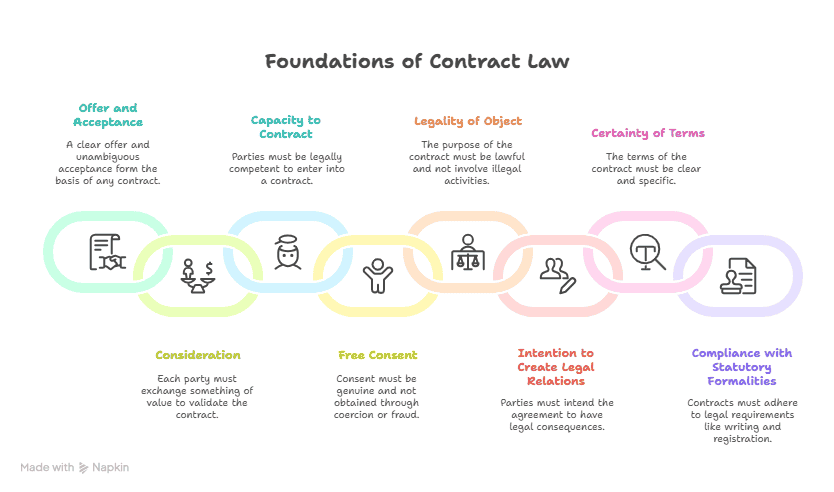Every successful business, be it a startup wanting to scale up quickly or a multinational company managing global operations, must rely on one thing: contracts.
Contracts are a legal framework that provides validity to employment relationships, partnership with vendors, sales deals, mergers and acquisitions, and many day-to-day transactions that companies must depend on. They provide a structure to promises, set the expectations and offer safety when things do not go as planned.
Without having proper contracts in place every business will become vulnerable to confusions, disputes and delays in operation. Contracts are an important backbone of growth of any enterprise since they give transactions proper clarity and legal enforceability.
What Is a Contract?
A contract is a legally enforceable agreement between two or more parties. It is not just a casual understanding – it creates binding rights and obligations that the law will uphold.
Consider this at two levels. Suppose A agrees to sell his bike to B for ₹50,000. At first, this is just an agreement, since both parties share a common understanding. Once B accepts, it becomes a promise, i.e., A has promised to deliver the bike, and B has promised to pay.
But this agreement becomes a contract only if it meets some important legal requirements like free consent, lawful consideration, and an intention to create formal relations between the parties.
Now let us see how this works in the world of business.
Understanding what is contract is essential for anyone engaging in business transactions.
For an enterprise, the difference between an agreement, a promise, and a contract is critical. A handshake deal between two suppliers may work informally, but when a multinational signs a multi-million-dollar outsourcing deal, a legally enforceable contract is the only safeguard against financial and reputational risk.
Every day in enterprises, this distinction plays out:
A verbal understanding with a vendor is only an agreement.
- A supplier promising to deliver raw materials at a price is a promise.
- A multinational company wanting to tie-up with another company or form a joint venture will executive formal contract so that the partnership becomes legally enforceable in the local or international courts.
In short, all contracts begin as agreements. However, only the contracts that are recognised and enforceable legally can protect the interests of a business properly.
Why are contracts important?
Contracts bring clarity, trust, and protection into personal and professional relationships. The rights and obligations of the parties and the remedies specified in a contract provide a sense of security to the parties involved.
In case of enterprises, contracts are the instruments that go a long way in ensuring that their businesses operate smoothly and as planned. These are essential for minimising risks in multi-party transactions, maintaining supply chains, and protecting business information.
But contracts only work if they are well-drafted. Ambiguous or incomplete terms often become the root cause of disputes, leading to wasted time, strained relationships, and costly litigation.
A carefully written contract prevents these issues by clearly defining obligations, deadlines, and remedies.
Where are contracts used?
Some common enterprise use cases of contracts include:
- Employment and consulting contracts that ensure clarity on job roles, compensation, and exit terms.
- Sales and distribution agreements to protect customer relationships and revenue.
- Lease and property contracts that help them secure office and manufacturing spaces worldwide.
- Vendor and service agreements for making the suppliers accountable for timely delivery of products and services.
- Partnership and joint venture contracts that govern cross-border collaborations.
- Non-disclosure agreements (NDAs) to protect trade secrets and intellectual property rights.
Without having the essential contracts in place, even the best businesses can drown in a sea of disputes, missed deadlines, and regulatory non-compliance. Poorly drafted or unmanaged contracts can result in costly disputes, regulatory penalties, and reputational damage that can jeopardise their business.
For global businesses dealing with hundreds or thousands of agreements, mananging every contract manually is simply not possible. This is where Contract Lifecycle Management (CLM) becomes essential.
We will talk more about this in the next sections.
Common Types of Contracts
Contracts can take many forms, depending on how they are made and what they are meant to achieve.
By formation, contracts may be:
- Express contracts, where terms are clearly stated (e.g., a written employment offer).
- Implied contracts, which arise from the conduct of the parties. For example, when a passenger boards an auto-rickshaw, it is understood that they will pay the metered fare at the end of the ride, even though nothing was expressly agreed upon in words.
- Oral contracts, based on spoken words (common in small business dealings).
- Written contracts, recorded on paper or digitally (preferred in most corporate transactions).
By enforceability, contracts may be:
- Valid, meeting all legal requirements. Example: A registered lease deed for office premises.
- Void, having no effect from the beginning. Example: An agreement to sell banned narcotics.
- Voidable, where one party can cancel it. Example: A contract signed under pressure from a dominant partner.
- Unenforceable, valid in principle but not enforceable due to technical issues. Example: A contract without mandatory stamp duty.
By purpose, common types include:
- Employment contracts, defining roles, salaries, and exit terms.
- Service contracts, like IT maintenance agreements.
- Sales contracts, such as a distributor agreement for FMCG products.
- Lease agreements, for renting office or retail space.
- Non-disclosure agreements (NDAs), protecting sensitive information during investor discussions.
- Partnership agreements, setting out rights and obligations among business partners.
In India, while oral contracts are generally valid, some, like property sales or lease agreements exceeding one year, must be in writing and registered to be enforceable.
Essential Elements of a Valid Contract
Not every agreement qualifies as a contract. For an agreement to be legally binding under the Indian Contract Act, 1872, it must meet certain key requirements. These elements ensure fairness, clarity, and enforceability.
1. Offer and Acceptance
There must be a clear offer by one party and an unambiguous acceptance by the other. For example, if a supplier offers to deliver raw materials at a fixed price and the buyer agrees, a valid offer and acceptance exist.
2. Consideration
Each party must exchange something of value, like money, goods, services, or even a promise. Without consideration, a contract usually cannot stand.
3. Capacity to Contract
The parties must be legally competent. This means they must be of sound mind, not disqualified by law, and above 18 years of age.
4. Free Consent
Consent must be genuine. If obtained through coercion, fraud, undue influence, or misrepresentation, the contract can be declared voidable.
5. Legality of Object
The purpose of the contract must be lawful. Agreements involving illegal activities are void.
6. Intention to Create Legal Relations
Both parties must intend the agreement to have legal consequences. A family arrangement to have dinner together is not a contract because there is no intent to enforce it in court.
7. Certainty of Terms
The terms must be clear and specific. Vague promises – like “I’ll pay you a fair amount” – may not be enforceable.
8. Compliance with Statutory Formalities
Certain contracts, such as property transfers or long-term leases, must be in writing, registered, or stamped as required by law.
Together, these components ensure that contracts are more than just words. They are reliable frameworks for business and personal commitments.

Important Things to Know About Contracts
Even when a contract appears valid, certain defects can make it unenforceable. For example, a contract may not be enforceable in court if its subject matter is unlawful, one party is a minor, the terms are too vague, or consent was obtained through coercion or fraud.
When such a breach does occur, the law offers remedies. The most common remedy is damages, which compensate the injured party for financial loss. In certain cases, courts may order specific performance, compelling a party to deliver on their promise. This type of relief is common in property transactions.
Another remedy is an injunction, which prevents a party from acting against the contract, such as disclosing trade secrets.
While verbal agreements are legally valid in India, they are risky in practice. Without written proof, enforcement becomes difficult and often leads to lengthy disputes. That’s why businesses, especially startups and enterprises, rely on clear written contracts.
Common drafting mistakes include vague language, missing dispute resolution clauses, or skipping statutory requirements like stamping and registration. These oversights can turn an otherwise solid contract into a weak one.
With modern contract management software, businesses can minimize these risks—automating drafting, storage, and tracking to make contracts clearer, safer, and easier to enforce.
How to Automate Contract Management?
Managing contracts manually can be slow, error-prone, and costly. This is why many businesses are turning to Contract Lifecycle Management (CLM) solutions for tasks like drafting, reviewing, storing, and tracking renewals. CLM is the process of automating each stage of a contract’s journey, from creation to execution to renewal.
Automation brings clear benefits. It speeds up contract drafting with standardized templates, improves accuracy by reducing human error, and strengthens compliance by flagging risks before they become disputes. With automated reminders for renewals and obligations, companies avoid costly lapses like missed deadlines or expired agreements.
Legal tech platforms such as Legistify make CLM practical and efficient. Businesses can draft legally sound contracts, store them securely in a centralized system, and track obligations in real time. Instead of searching through piles of paperwork or email chains, teams can access dashboards that show which contracts are pending, which are at risk, and which need immediate attention.
By automating contract management, organizations not only save time but also reduce disputes and increase operational confidence. Going forward, we expect technology to play an even bigger role in reshaping how contracts are created and enforced.
The Future of Contracts
Contracts are evolving beyond paper and pen. With the rise of smart contracts (blockchain-based agreements that execute automatically when conditions are met) transactions are becoming faster and more transparent.
Artificial intelligence is also transforming the way contracts are drafted and reviewed. AI tools can flag risky clauses, suggest better language, and predict compliance issues before they escalate.
In India, the adoption of e-signatures and digital records is accelerating, driven by the IT Act, 2000, and the growing need for remote, paperless workflows. Businesses increasingly prefer digital contracts for speed, convenience, and stronger audit trails.
Together, these trends point toward a future where contracts are not just static documents but dynamic tools that blend law and technology to make business more secure and efficient.
Manage Contracts with Confidence
Contracts are the foundation of trust and enforceability in both business and personal life. They give structure to commitments, protect interests, and reduce the risk of costly disputes.
For businesses, contracts are not just legal documents—they are tools to drive clarity, accountability, and growth. Ignoring them or relying on poorly drafted agreements can expose companies to risks that go far beyond legal battles.
That’s why modern organizations are turning to technology. Schedule a demo of Legistify’s AI-First Contract Management Software to see how your team can draft, store, and track contracts with complete security and efficiency.
Frequently Asked Questions
1. Can a minor enter into a contract?
No. Under the Indian Contract Act, 1872, a person must be at least 18 years old to enter into a valid contract. Any agreement made by a minor is void from the very beginning, even if both parties consented.
2. Do all contracts need to be in writing?
No. In India, contracts do not always need to be in writing to be valid. Oral contracts are generally enforceable if they meet the legal essentials of a contract. However, certain agreements, like property sales, lease agreements over one year, or contracts that require registration under specific laws, must be in writing to be legally recognized.
3. Are digital contracts enforceable in India?
Yes. Digital contracts are enforceable in India as long as they meet the requirements of the Indian Contract Act, 1872, i.e., offer, acceptance, consideration, and lawful object. Thanks to the Information Technology Act, 2000, e-signatures and electronic records are legally recognized.
4. How long does a contract remain valid?
A contract remains valid until the obligations under it are fully performed or until it expires based on the timeline stated within the agreement. Some contracts are for a fixed term, like a 3-year lease, while others may continue indefinitely until terminated by either party.
5. What happens if one party breaches a contract?
If a party breaches a contract, the aggrieved party has legal remedies under the Indian Contract Act, 1872. The most common remedy is damages, which compensate for financial loss. In some cases, courts may order specific performance, requiring the defaulting party to fulfill their obligations. Another remedy is an injunction, which restrains a party from acting against the contract.



